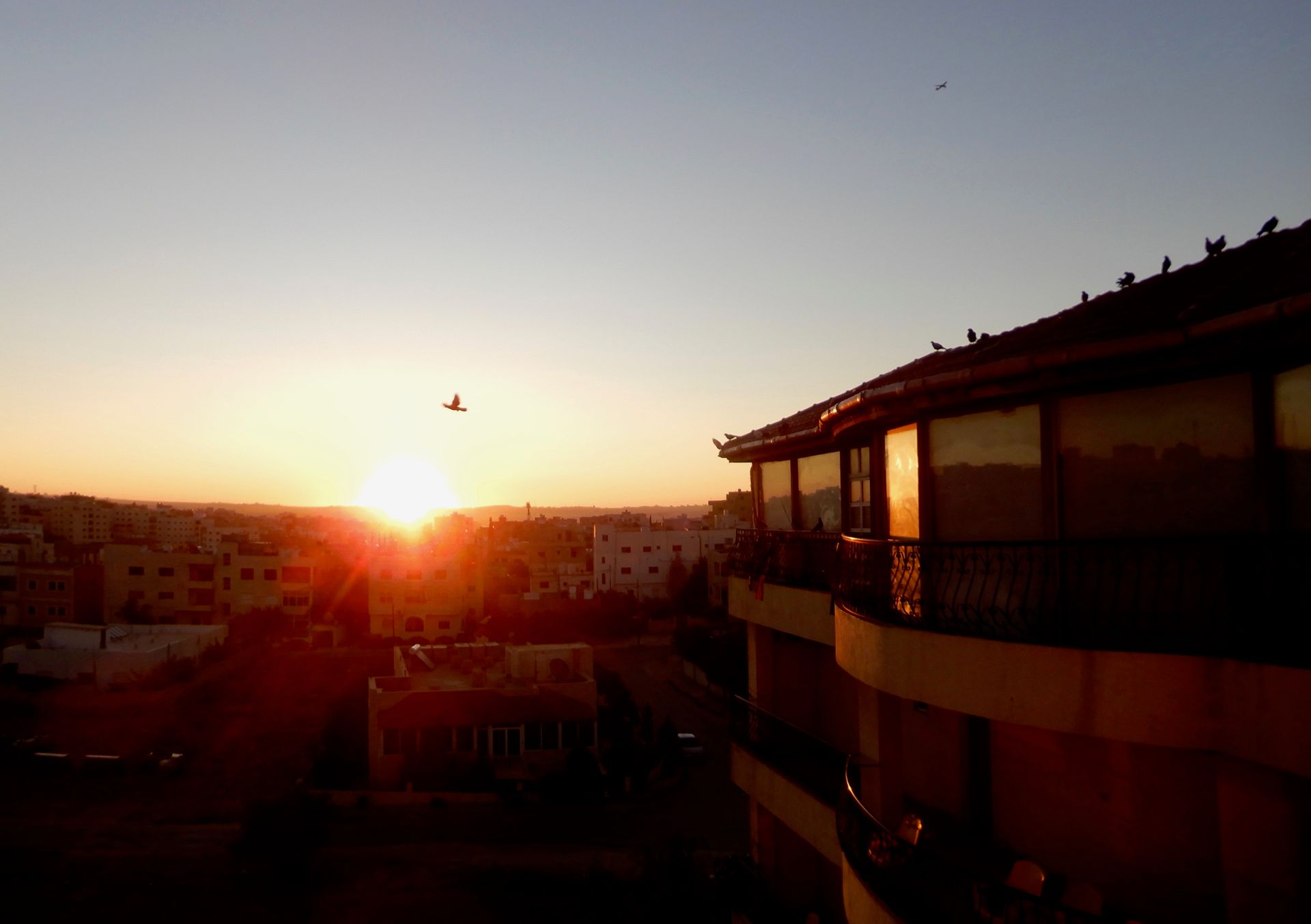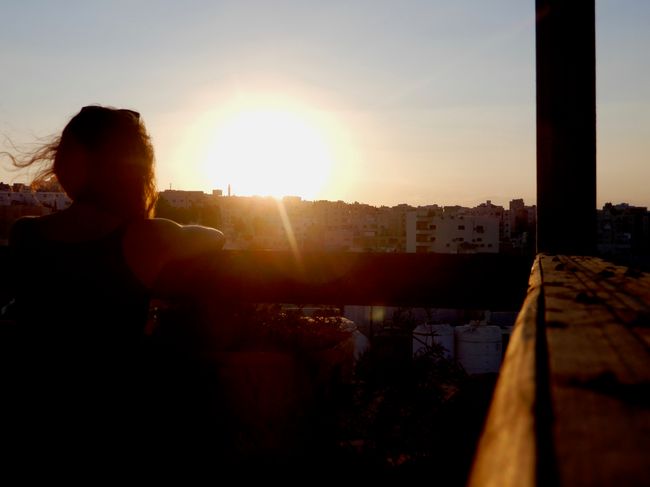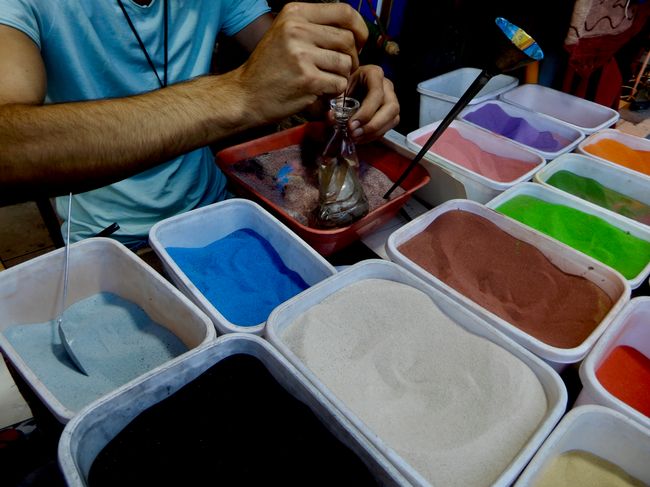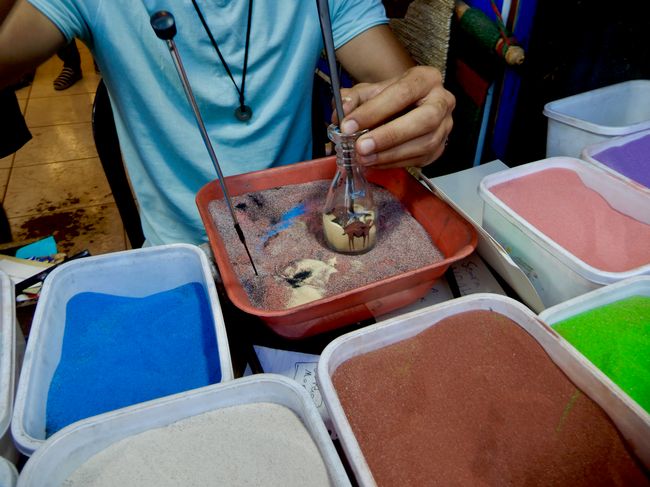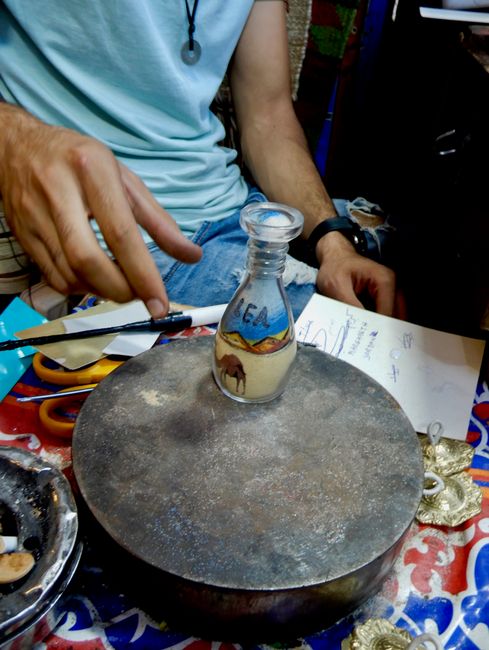Hold on.
Wotae: 13.10.2019
Wɔ Nudɔdɔ na Nyadzɔdzɔgbalẽ
Saturday, October 12th
9 am. When I get up this morning, my foot feels a little better. The swollen ankle still looks like a mutant foot, but I can walk relatively normally again. I have a quick breakfast and take another look at my Arabic materials (as if I could learn anything important right before my class), then I make my way to the university.
All good things come in threes: the bookshop is open and I can get the script for the lesson, which the seller still needs to copy. I meet four other participants from my class, whose names I unfortunately no longer know, but they don't seem to be interested in a conversation anyway. So I start walking to the classroom ahead of them, where our teacher is already sitting at the front, waiting for the rest of his students.
"Iva?" he asks me, looking in my direction. I nod, and he asks me another question that I don't understand. Imad, the guy from Hamburg, who sits in front of me again, translates for me. He wants to know what my father's name is. I think this is a somewhat arbitrary question, but I have learned by now not to question teachers here. So I answer politely, and Mr. Ahriz asks me what my grandfather's name is. He takes notes while I answer, and I would really like to know if he has now written the names "Joachim" and "Heinz" in Arabic script next to my name. Maybe such questions are just his way of making small talk. Anyway, the rest of the group arrives and the class begins.
Mr. Ahriz now hands out a sheet to all of us with a story in Arabic. From the picture above the story, it looks like some kind of fable. I understand that it's about a lion and a fox, and I can decipher some of the words I read, but it's not enough to understand the overall context. Now comes one of the uncomfortable moments again: Mr. Ahriz stands in front of me and asks me in Arabic if I can read, which I only understand after Imad translates for me. I notice how unaccustomed I am to being the one who lags behind in a group, and it's definitely not a good feeling. Uncertain, I start reading aloud and am interrupted after half a sentence. "Ok," Mr. Ahriz says. Although I can't assess whether he is satisfied or has already classified me as a hopeless case, I am glad that I don't have to say more.
The group now starts talking about grammatical subtleties, which I deduce from the addresses on the board, but I don't understand their meaning. So I don't even bother taking notes, and instead try to pick up as many words as possible from what is being said. However, "many" would be an overstatement. After an extensive discussion, the first break finally arrives. I'm glad to get out of the overly air-conditioned room and into the sun. The other participants walk past me in silence to go on break. I realize that nobody here studies social work, I think to myself and relay it to Ammar. I realize that I've just started generalizing even though it goes against my principles, as he points out with a laugh. So I remind myself not to become spiteful: it's definitely my problem to put myself in a course full of native speakers as a complete beginner. So no complaining. Although I still doubt whether it makes any sense at all for me to be in this course, I definitely don't want to give up. So I quickly ask Ammar to tell me what the lion story is about and then go back to class.
After the break, the text is already outdated: we focus on the script that I had just printed before the class. Everything is written in Arabic, and I don't even try to understand the task we are supposed to do now. It's about forming sentences that my classmates will then read out one by one. Physically, I'm sitting in the middle of them, but in reality, I'm not there. In fact, at the moment, I prefer to be treated like air rather than getting into an uncomfortable situation again, where I don't understand the simplest sentences that Mr. Ahriz says to me. So I endure, until I realize that the class is over when everyone else gets up and leaves.
I see that Imad and Ibrahim are still there, so I stay as well. Mr. Ahriz had offered us last week to give us extra tutoring after our lesson. The three of them talk in Arabic, then Ibrahim turns to me: "Eva, do you want to join us learning?" I'm not quite sure how to interpret this question, since it was already agreed last week that I would participate in the tutoring. Nevertheless, I nod. At the risk of not really being welcome. But I won't give up that easily. The others tell me that they are going to pray first, and then we will meet on the terrace.
I'm glad that we don't have to spend more time in the freezing cold classroom and let the sun shine on my face outside until Mr. Ahriz, Ibrahim, and Imad join me. Mr. Ahriz waves the text he handed out to us at the beginning of the class. "Qisa," he says, which means "story" in Arabic. I understood it, but Ibrahim translates it for me anyway. Word by word, we now go through the first part of the text, with Ibrahim as my simultaneous interpreter. Mr. Ahriz always makes sure that I really understand the meaning and has Imad and me take turns reading out loud. It takes me at least five times longer for everything, and I stumble repeatedly. The letters just don't flow smoothly yet. I feel really sorry for the other two who have to endure my stuttering, but Mr. Ahriz patiently lets me read again and again. "And again... And again."
After an hour, he finally releases us. "Khalas!" he says. "Finished." Now he wants to know once again why I am here in Jordan and why I want to learn Arabic, which the other two translate for me. He is happy with my answer and says that he wants to help me with my Arabic. That I read well and will improve a lot if we have these private lessons every week from now on. I know that this is definitely an exaggeration, but it feels good to hear something nice after four hours of Arabic overload.
I come home with a buzzing head, where Rebecca and Lea are already getting ready to go into town. They want to meet Ibrahim, whom they met while partying yesterday and who works in a souvenir shop in Downtown. I'm glad for any change and join them.
Ibrahim is a super nice and funny person, and he shows us the shop, which is right next to our favorite sandwich place in the middle of Downtown. If we ever need anything, we can always come to him, he says. Lea doesn't need anything, but she still gets something: she just wants to know how Ibrahim's friend, the shop owner, makes the glasses with colored sand that you can buy on every corner here, and promptly gets a sand glass with the inscription "Lea" made. Even though she hurried to say that she didn't want one. It's fascinating how you can create a detailed camel with colored sand, but I wouldn't necessarily want to put such a glass in my apartment as decoration. Lea doesn't really either. But it's too late.
We take a leisurely stroll through our beloved market, meet Omar, the employee from our Jordan Tower Hotel in Downtown, once again (yes, it really is like a village pub here), and then sit in the Cultural Center for a while to learn Arabic. You can never invest enough time in this language.
From my Arabic tutoring:
read- قرا
paragraph- فقرة
idea- فكرة
title- عنوان
meaning- معنى
Wɔ Nudɔdɔ na Nyadzɔdzɔgbalẽ
Ŋuɖoɖo
